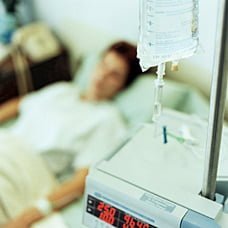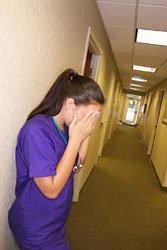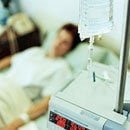 The Health Care Commission accused the Kent and Sussex NHS Trust of "significant failings in infection control" after 90 patients were known to have died of the super-bug "Clostridium difficile" in three of its hospitals last year. The deaths of another 200 are thought to be indirectly due to contracting the bug. Kent police and the Health and Safety Executive are considering the unprecedented action of pressing manslaughter charges against the Trust.
The Health Care Commission accused the Kent and Sussex NHS Trust of "significant failings in infection control" after 90 patients were known to have died of the super-bug "Clostridium difficile" in three of its hospitals last year. The deaths of another 200 are thought to be indirectly due to contracting the bug. Kent police and the Health and Safety Executive are considering the unprecedented action of pressing manslaughter charges against the Trust.
Faced with the evidence of the deaths of hundreds of patients, many of whom were in hospital for routine surgery, Labour Health Secretary Alan Johnson has called the report "shocking" and has expressed his displeasure by questioning the large pay-off to the Chief Executive of £250,000. Whilst it is unjustifiable that high-paid health service managers should receive this sort of pay off after resigning due to the number of patients that have died in their care, it is not good enough that she should be made a scapegoat for what are the consequences of government policy. Since the release of this report the press has run a campaign, not just against the management of this Trust but against NHS staff in general, citing relatives of patients who accuse nurses of being more interested in "chatting" than caring for their relatives and delivering poor care.
Hygiene
It is quite unacceptable that elderly patients are told by nurses to go to the toilet in their beds, that water jugs are not washed properly after use and other serious breaches of hygiene are taking place in our hospitals but the report of the Health Care Commission sounds all too familiar. The truth is that nurses are run off their feet whilst trying their best to provide good care. To quote from the report –
"The shortage of nurses contributed to the spread of the infection because nurses were often too rushed to clean their hands properly, empty and clean commodes, clean mattresses and equipment properly and wear aprons and gloves appropriately and consistently."
The report said of the Trust board itself that "it failed to protect the interests of patients by missing the first outbreak, being slow to react effectively to the second outbreak, and continuing to display poor infection control and hygiene during the course of the investigation."
Complaints
In the view of the Commission, the Trust’s board was too preoccupied with government imposed financial targets to make hygiene a priority. Complaints and warnings from both hospital staff and patients were ignored.
The growth in the number of super-bugs in hospitals, such as C-difficile and MRSA, is not limited to Kent and Sussex. Since 2004, when figures have been kept, there have been over 176,000 C-difficile infections. The number actually increased by 8% in 2006. Other reported areas have included Nottinghamshire, Devon, and Stoke Mandeville, where 30 patients are known to have died.
Why, when the Labour Government is putting more money into the NHS, are we getting these appalling conditions in hospitals which allow patients to become ill and die unnecessarily?
 Cleaning is now outsourced to private companies as a way of saving money. This means that the trusts do not have control over the staff who are responsible for hygiene. There are too few nurses. This is at a time when millions of pounds are being wasted on Private Finance Initiatives for hospital buildings which may never be opened. Private companies are milking the
Cleaning is now outsourced to private companies as a way of saving money. This means that the trusts do not have control over the staff who are responsible for hygiene. There are too few nurses. This is at a time when millions of pounds are being wasted on Private Finance Initiatives for hospital buildings which may never be opened. Private companies are milking the
NHS and the Labour Government is allowing this to happen. The proof? In Wales, where cleaning is now carried out in-house rather than by contractors, MRSA infection is less than half the English rate.
Privatisation kills.






